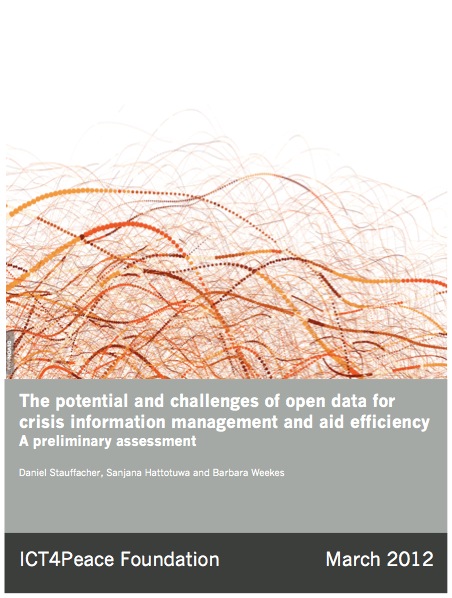The ICT4Peace Foundation is pleased to inform you about its most recent paper entitled The potential and challenges of open data for crisis information management and aid efficiency: A preliminary assessment.
The authors, Daniel Stauffacher, Sanjana Hattotuwa and Barbara Weekes of the ICT4Peace Foundation, aim to explore both the strengths and potential challenges of open data for crisis information management, crisis response and aid efficiency.
Access to data or information translates into empowerment; power to make informed decisions, to solve problems, to generate economic activity, to improve living standards and, in the case of humanitarian emergencies, to protect and save lives. The integral value and many positive spin-off benefits, in particular for the work of the humanitarian response community, emerging from this flattening of the global information hierarchy, need to be reinforced for those who would prefer to keep data in silos, locked away through licenses, patents and proprietary technology. At the same time, the negative use of collated or triangulated open data for destructive purposes against populations or individuals at risk should not be underestimated.
The paper raises issues for further study and exploration including the impact of the ever-increasing number of organizations and governments both opening their data, and integrating data from sources outside traditional channels; the creation of new open data sources such as the Core and Fundamental Datasets of the UN Crisis Information Strategy (CiMS); the risk of open data for vulnerable populations and IDPs; the need to uphold the “do no harm” principle of humanitarian work in this newly emerging environment; the potential benefits of combining open data with crowd-sourced information and feedback to increase quality and veracity of information; the role of crowd-sourced information in a fragile state context; and the need to increase technical know-how and capacity building, particularly in countries at risk.
Despite the explosion of open data and information sharing, there is still quite a long road to go before all the necessary actors are convinced of the benefits of openness and transparency. There are still serious challenges in terms of licensing, proprietary technologies and commercial interests, which need to be addressed. But, through the initiatives and expertise of governments, NGOs and transnational corporations, information is being unlocked and published. Citizens with new tools and devices are producing their own information. We are at the dawn of a new age of empowerment and perhaps the biggest democratic process in the history of mankind. This fast-moving process requires detailed further study, both of the issues raised in this paper and also building on the important work being done by a myriad of NGOs and international organizations.
Download the report as a PDF here.

